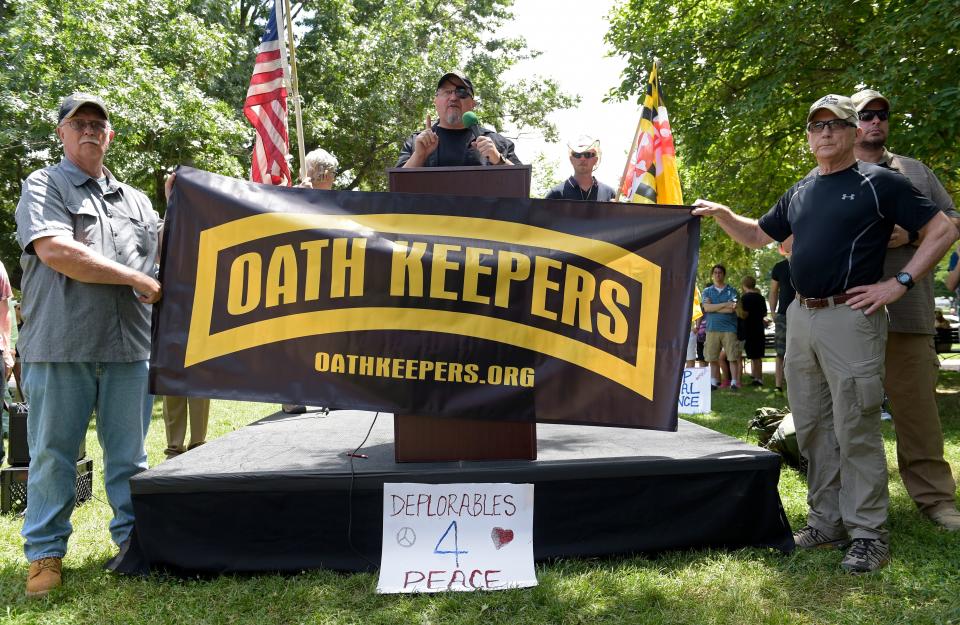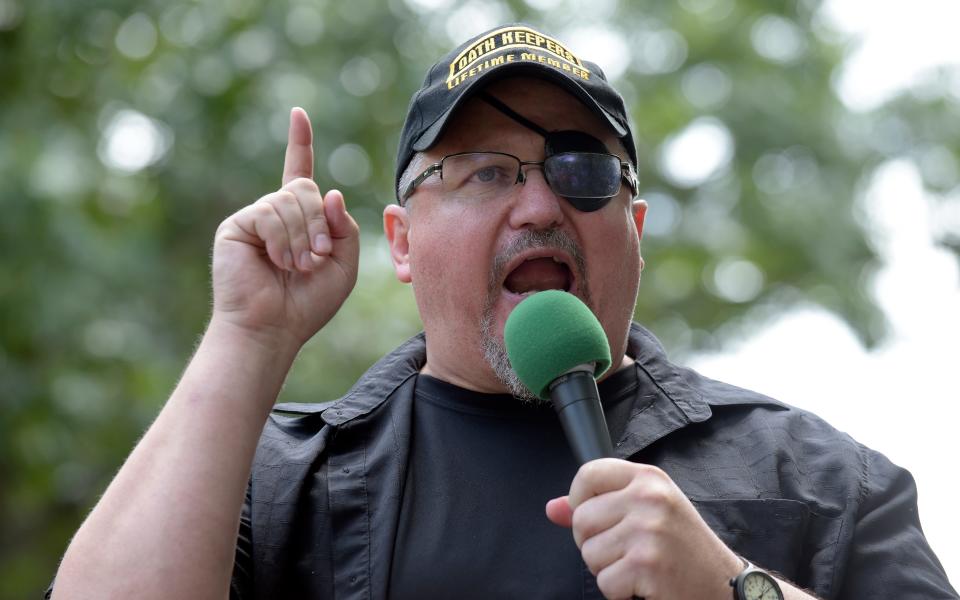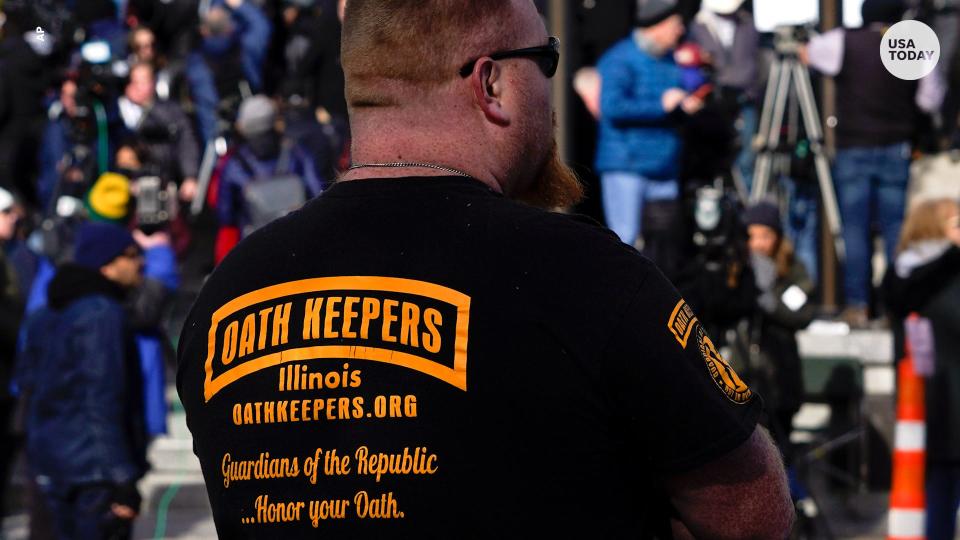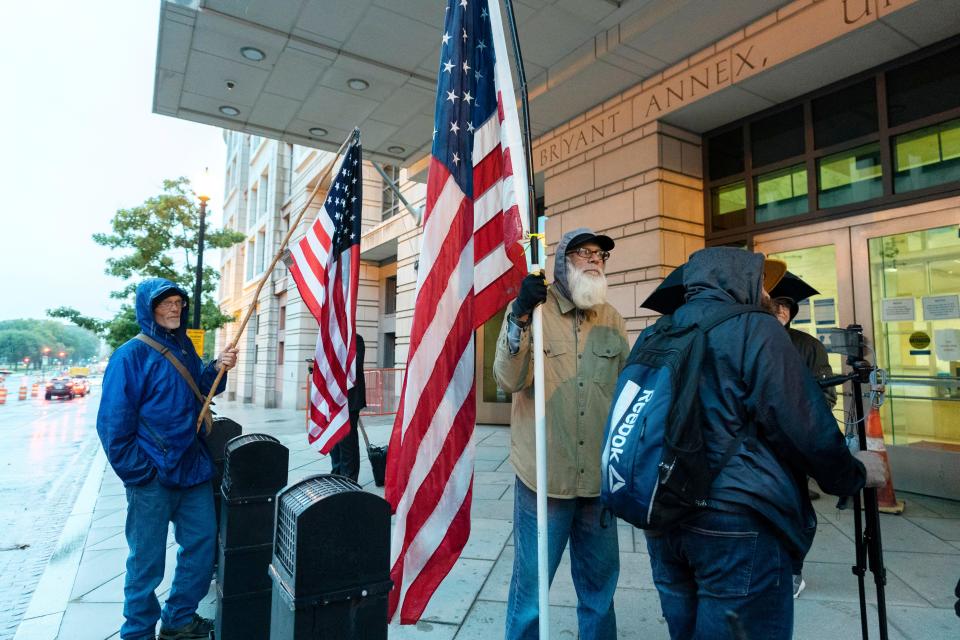Encrypted messages, secret recording: Inside week one of the Oath Keepers trial and a look at what's next
WASHINGTON, D.C. – Prosecutors presented encrypted messages, a secret recording and witness testimony in the case against the right-wing militia group Oath Keepers last week, a potential sign of what could be ahead as the trial moves into Week 2 on Tuesday.
Leader Stewart Rhodes and four other members of the Oath Keepers – Ohioan Jessica Watkins, Virginian Thomas Caldwell and Floridians Kelly Meggs and Ken Harrelson – face numerous charges in connection with the Jan. 6 Capitol attack; the trial began in federal court last week.
That includes the rare charge of seditious conspiracy. In legal terms, that means conspiring against the government through the use or threat of force in an attempt to prevent the peaceful transfer of power or functioning of the government. That charge alone holds a maximum prison sentence of 20 years.
Other counts in the indictment include obstructing an official proceeding and conspiring to obstruct it;conspiring to prevent an officer from discharging duties; destruction of government property; civil disorder; and tampering with documents or proceedings.
To earn a guilty verdict from the Washington, D.C., jury, prosecutors must prove those charges beyond a reasonable doubt.
Here's everything we learned during the first week of the Oath Keepers' trial.
Who are the Oath Keepers?: What we know about the right-wing group, members' trial

Both sides lay out roadmaps to cases
The prosecution:
The government painted members of the Oath Keepers as masterminds behind a long-planned and carefully coordinated plot to stop the peaceful transfer of presidential power on Jan. 6, 2021 – by any means necessary.
“Notice the role these five defendants played: leaders,” Assistant U.S. Attorney Jeffrey Nestler said in the government’s opening remarks.
Stewart Rhodes – a Yale-educated, eye-patch wearing founder of the Oath Keepers – is the leader of them all, the prosecution argued. During the Capitol attack, Rhodes remained outside the building “like a general overlooking a battlefield while his troops stormed inside," Nestler said.
The defense:
Defense attorneys for Rhodes and his four co-defendants say the government's portrayal of the Oath Keepers and its members is wrong.
“Improper context can mislead and lead to improper conclusions,” Jonathan Crisp, Watkins’ attorney, said in his opening remarks.
Oath Keepers trial opening remarks: Prosecutors argue militia members were 'leaders' on Jan. 6

The evidence
Prosecutors showed evidence that the Oath Keepers began planning for a violent confrontation in Washington the same day Joe Biden was named president-elect. Rhodes wrote in a Nov. 7, 2020, chat on Signal, an encrypted messaging app, to other Oath Keepers that they must refuse to accept his nomination and get their "gear squared away and ready to fight."
On a Nov. 9 conference call among more than 100 Oath Keepers, secretly recorded by one attendee, Rhodes spelled out plans to travel to Washington for the Million MAGA March later that month, where thousands gathered to protest purported election fraud. No widespread election fraud has ever been found in the 2020 election.
Defendants Watkins and Meggs, also on the call, weighed which weapons could be legally brought into Washington, like pepper spray, tasers and stun guns – “and it doesn’t hurt to have a lead pipe with a flag on it,” Meggs said. Many of the plans discussed on the call were later replicated or refined on Jan. 6, prosecutors alleged.
“We’re not getting out of this without a fight,” Rhodes said on the call.
Prosecution's evidence: Messages after 2020 election show plans for armed confrontation in Washington
A Dec. 2, 2020, document titled "OP PLAN D.C. FIRST DRAFT,” created by defendant Caldwell, laid out an early operation plan for the Oath Keepers, the prosecution alleged. In it, Caldwell suggests bringing “striking weapons” and includes a link to a tactical camping tomahawk ax called “Zombie Killer.”
“When the battle is joined, apply the striking weapon wherever it will do the most good, including to the head or face area," Caldwell wrote in the plan.
He also suggests burner phones and unregistered weapons, noting that it would “lend credence to plausible deniability.” Those weapons should be wiped down and discarded as soon as practicable, Caldwell wrote in the document.
Novel defense: A 1800s-inspired defense meets most significant Jan. 6 prosecution yet

The testimony
Six witnesses called by the prosecution have offered insight into the Oath Keepers' organization, collective psyche and plans ahead of Jan. 6.
FBI Special Agent Michael Palian was sent to the Capitol on Jan. 6, 2021 after violence broke out that day. He described the scene as looking like a “bomb had gone off in there." Much of the prosecution's message and audio evidence was verified and analyzed by Palian.
Former Oath Keeper John Zimmerman, who led a North Carolina chapter of the group, detailed their plan to travel to Washington for the Million MAGA March in November 2020. Concerned about violence from "BLM and Antifa," the Oath Keepers stockpiled 12-15 long guns in his van outside Washington, n case Trump invoked the Insurrection Act.
Abdullah Rasheed, a former Oath Keeper from West Virginia, testified that he recorded the Nov. 9, 2020, call. "The more I listened to the call, it sounded like we were going to war against the United States government," he told the jury. The defense sought to discredit Rasheed by pointing to a prior felony conviction.
Former Oath Keeper Michael Adams testified that he rebooted and led the Florida chapter of the organization. He said he resigned from his position in December 2020 due to the Oath Keepers' "posture as a militia group," which he found "problematic."
U.S. Capitol Police Special Agent Ryan McCamley testified to Rhodes' presence in Washington on Dec. 12, where the militia leader later said at a rally that if Trump did not invoke the Insurrection Act, "we’re going to have to do it ourselves later, in a much more desperate, much more bloody war." McCamley confirmed during cross-examination by the defense that he did not witness Rhodes engaged in anything illegal.
FBI Special Agent Byron Cody began testifying Friday about Rhodes' public pleas to Trump to invoke the Insurrection Act.

What's next?
The Oath Keepers trial will resume after the long weekend Tuesday morning. Though there are sure to be some surprises, here's what to expect when it picks up again:
FBI Special Agent Byron Cody will retake the stand for cross-examination by Rhodes' attorneys.
Prosecutors said Friday that two FBI agents who recovered items from defendants Meggs and Watkins' homes, plus Arizona's Ernest Hancock, who recorded a video on Jan. 6, could testify. That depends on whether Meggs’ attorney, Stanley Woodward, agrees that the evidence recovered by the FBI and Hancock's video from Jan. 6 are authentic. If he does not, it would require those individuals to testify to the evidence's authenticity.
Hancock has attempted to invoke the Fifth Amendment, prosecutors said, though they do not believe he holds that right under these circumstances. Last week, Judge Amit Mehta weighed in on requiring the individuals to testify: "It's going extend the length of this trial, and it's not going to make me happy," he said.
This article originally appeared on USA TODAY: Oath Keepers trial: What happened in week one and what's coming next

